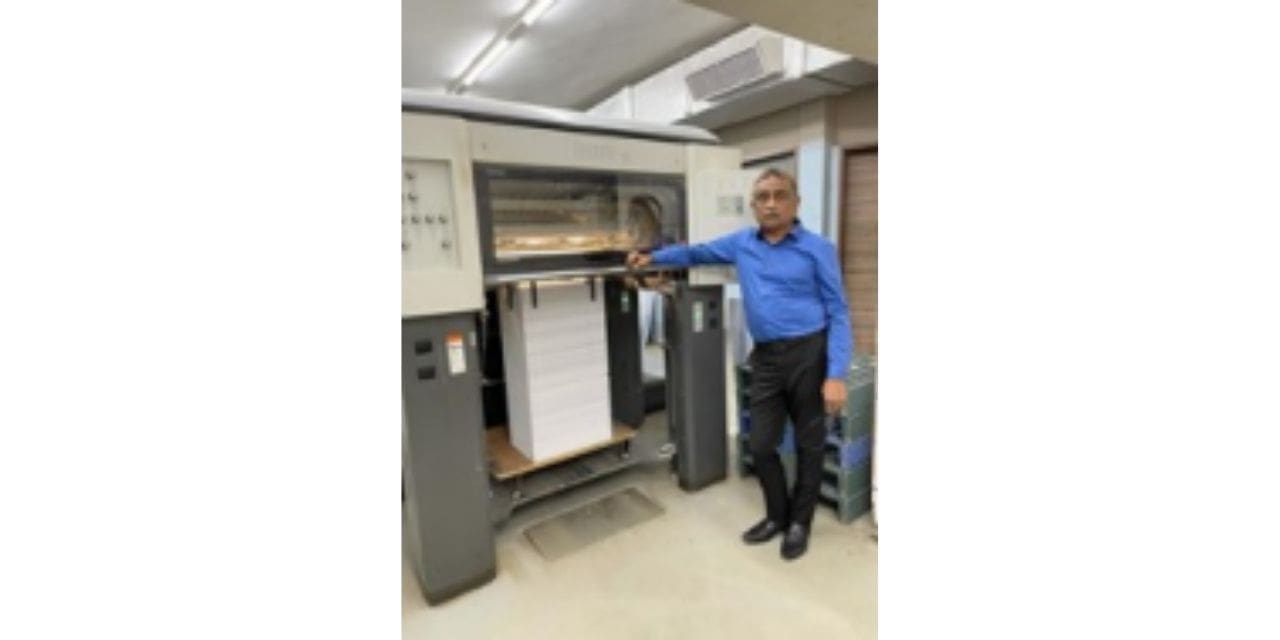Heidelberg press updated with next-generation AMS Spectral UV curing modules
Maruti Printing transformed its business as the first printer in India to adopt the latest LED-UV curing technology from AMS Spectral UV, a Baldwin Technology Company. The hybrid system, which includes traditional UV modules, has been in production for nearly two years and has significantly expanded the offset printer’s capabilities for its customers, including adding the ability to print on all types of plastic substrates.
Not only does Maruti have the distinction of being an LED-UV trailblazer in India, but it also is first in the market to upgrade a high-speed, high-performance Heidelberg Speed Master 72F+L six-color printer with coating tower—which prints up to 15,000 sheets per hour—with AMS Spectral UV’s high-power AMS XP9-I Series LED-UV and P3 Smart UV curing modules.
“We are the first ones to bring the latest generation of LED and UV technology from AMS Spectral UV to the Indian market on a six-color and coater Heidelberg machine, the premium technology and market leader in this space,” said Maruti Printing CEO Bradesh Shah. “This strategic investment expands our offset print capabilities well beyond most commercial printers and allows us to take on the most demanding, creative pieces for our customers.”
Established in 1986 and headquartered in Ahmedabad, Gujarat, Maruti serves customers throughout India, providing offset printing of scratch cards, banners, booklets, brochures, calendars, danglers, pamphlets, posters, stickers and envelopes.
In January 2020, Maruti took delivery of two AMS XP9-I Series LED-UV modules to cure colors in the interdecks. The modules are ideal for the highest-speed curing situations that require consistent peak intensity to the substrate, which is the case for Maruti’s offset printing standard of perfection with every cure.
To cure ink, as well as a growing variety of LED coatings, Baldwin’s AMS Spectral UV modules can be located after print units, or in the press delivery after the coater. When inks and coatings are cured with LED-UV, they become instantly dry via photopolymerization, allowing for printing on any substrate, including plastics and metallized stocks. Plus, work can be immediately finished and sent to the bindery once it comes off the press, without the need for heat, spray powder or drying time.
“Our XP9-I Series LED-UV modules, powered by our robust NS Series chips and our all-new SC-I generation control system, deliver the highest level of curing performance and are particularly suitable for the harsh Indian production environments, where extreme temperatures and humidity often pose a challenge for inferior equipment,” said Hemant Desai, Managing Director of Baldwin Technology’s Baldwin Vision Systems in India, the sole distributor for AMS Spectral UV products in the region. “There is an emerging group of Indian printers that are seeking to achieve the highest possible levels of quality and productivity, and Maruti’s vision matched up well with ours.”
In addition, Maruti took delivery of two P3 Smart UV curing modules for installation at the end of the press to cure any type of UV coating and expand the company’s scope of coating compatibility to general UV coatings in order to offer its customers the widest range of UV printed choices in the Indian market.
The P3 Smart UV housings are completely liquid-cooled to ensure safe, consistent performance and increased uptime, and modules feature a universal design, so that any unit can fit any print unit location. P3 modules can be changed, inspected and cleaned quickly and easily, without tools, and lamps slide and lock into place smoothly and securely.
The durability of the equipment and its chipset was a critical deciding factor in India’s climate. The latest-generation power-and-control cabinets are dust- and moisture-resistant, allowing them to withstand extreme heat and humidity, as well as powder and airborne contaminants, making the equipment ideal for operation in stressful conditions anywhere in the world. AMS Spectral UV’s latest generation of LED chips, designed for the highest-intensity curing applications, enable the curing of LED inks and coatings at record-setting speeds. They are built with resilient components, and the semi-conductor components are sealed, which allows the chips to work in a variety of rugged environments. Additionally, integrated circuits incorporated into the design electronically protect the LEDs and the entire system.
“The system also features AMS Spectral UV’s InteliLED™ IoT solution for constant monitoring and remote trouble-shooting, which have become especially important in these pandemic times,” Desai added. “The technology allows for real-time and historical monitoring of UV output to ensure uninterrupted curing results. Real-time data is measured, trended and historically analyzed for any variances in temperature, electrical function and UV output that could lead to downtime or a reduction of curing performance every second for the life of the equipment. Maintaining rich, granular data related to system performance can help identify and correct issues long before they arise.”
“Working with AMS Spectral UV and Baldwin was the right choice for us and an easy choice,” Shah said. “Their attention to service, quality and high-performance systems all came together. There are a lot of low-power LED offerings in the market that won’t deliver the performance on our high-speed Heidelberg machine we demand, and quality was key to the decision to go with AMS Spectral UV. It goes without saying, we need assurance we can run at peak performance every day, even with India’s temperature and humidity conditions.”
Desai added that a key criterion behind Maruti’s decision to choose the company’s technology was its responsive, high level of support. Baldwin Vision Systems in India is located in Gandhinagar, famous as the home region of India’s renowned peaceful activist Mahatma Gandhi, and nearby the printer, which has helped the two companies forge even closer ties.
“Bradesh has graciously agreed to open Maruti’s doors to Baldwin’s customers to see the LED-UV and UV systems in action,” Desai summed up. “He has also agreed to have our open house at his plant once COVID-19 restrictions have eased. It’s a great mutually supportive partnership.”

